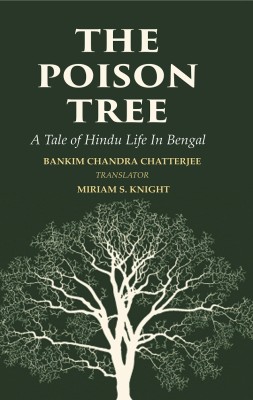The Poison Tree: A Tale of Hindu Life in Bengal(Paperback, Bankim Chandra Chatterjee, Translator: Miriam S. Knight)
Quick Overview
Product Price Comparison
About The Book: "The Poison Tree" (Bishabriksha) is set in Bankim ChandraŌĆÖs own time. Nagendra gives refuge to a young widow Kundanandini in his own house, who is orphaned after the death of her father. He becomes attracted to the girl and is torn between his devoted wife Suryamukhi and the beautiful Kundanandini. There are other characters like Kamalamani, NagendraŌĆÖs sister, Taracharan who is desirous of Kundanandini, etc About The Author: Bankim Chandra Chatterjee (1838-1894), Indian author, whose novels firmly established prose as a literary vehicle for the Bengali language and helped create in India a school of fiction on the European model. Bankim Chandra was a member of an orthodox Brahman family and was educated at Hooghly College, at Presidency College, Calcutta, and at the University of Calcutta, of which he was one of the first graduates. From 1858, until his retirement in 1891, he served as a deputy magistrate in the Indian civil service. Miriam Singleton Knight (1834ŌĆō1908), Translator of the works of Bankim Chandra Chattopadhyay; also known as Minnie Knight, n├®e Spurr, Miriam S. Knight, M. S. Knight and Mrs. J. B. Knight, Works: Translations; The Second Daughter-in-law (1882, tr. from Sivanath Sastri) (transcription project); The Spoilt Boy (1883, tr. from Peary Chand Mitra, with Narendranath Mitra) (transcription project); The Poison Tree, A Tale of Hindu Life in Bengal, with a preface by Sir Edwin Arnold (1884); Shornalata (1884) (tr. from Taraknath Gangopadhyay) (transcription project); Lalita and Saudamini or, The Mother's Device (1891) (tr. from Taraknath Gangopadhyay) (transcription project); Krishna Kanta's Will, with introduction, glossary, and notes by J. F. Blumhardt (1895); The Globe of Gold (1896) (tr. of Subarna-Golak by Bankim Chandra Chattopadhyay, The Indian Magazine and Review, No. 303, March 1896, p. 125); Stories of Bengalee Life (1912) (tr. of stories by Prabhat Kumar Mukhopadhyay, with original author).


